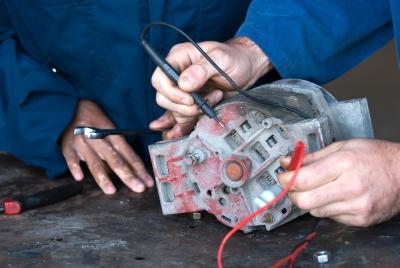
The days when a mechanic could do his work with a good set of wrenches is gone. Cars use sophisticated electrical systems that are powered by computers. To work on cars produced since the 21st century, auto mechanics need an arrangement of technology, both new and old, to work on cars.
While the technology in cars has advanced since the iconic days of the 1950s, some tools that rely on hydraulic systems are as useful as ever. Hydraulic tools use the force of compressed liquids or gasses to produce, and maintain, a great deal of force. This is useful in the lifts that raise cars up so mechanics have greater mobility in working on the car's undercarriage. This same force is used in power tools to rapidly loosen or tighten bolts.
Computers have made the job of diagnosing a car's problem a much quicker process. Instead of having to chase down sounds or performance symptoms, the car's computer system can tell what systems are not working properly, and translate these into error codes. To read these error codes, mechanics use a device -- as of 2010 it was the OBD-II -- that hooks into a special port in the car's cabin to interface with the car's computer and display the error codes.
Auto mechanics can use the port which interfaces with the car's computer for more than just retrieving error codes. With the right wires and software, mechanics can plug their laptops into the car itself to retrieve real-time information from the car's computer. This can display data such as the car's coolant temperature, fluid levels, absolute throttle position, and intake manifold absolute pressure. Getting all this information at once saves the auto mechanic a lot of time examining your car.
As cars run with sophisticated computers, they also have sophisticated electrical systems to power them. To diagnose problems in these systems, auto mechanics use multimeters. These devices can measure current, voltage, and resistance. Advanced multimeters can even report data on the system's frequency and duty cycle. Mechanics can use this data to determine if the reason your car won't start is because it has a bad battery, or a problem in its charging system.